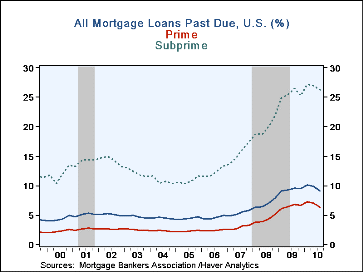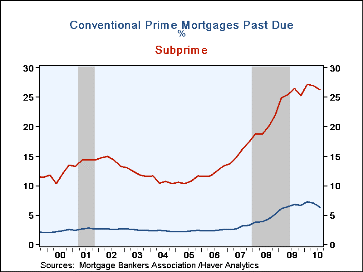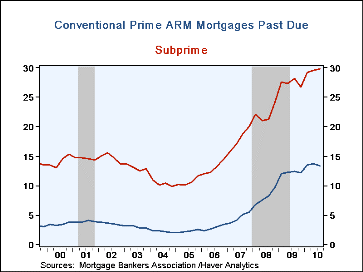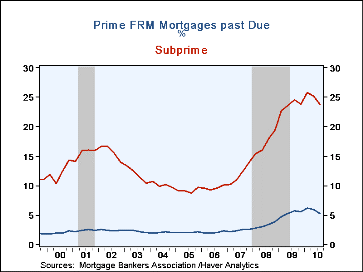 Global| Nov 19 2010
Global| Nov 19 2010U.S. Mortgage Delinquencies Slip
by:Tom Moeller
|in:Economy in Brief
Summary
It may be because the mortgage pool has fewer loans in it, but the percentage of loans that are delinquent has peaked. As of Q3, the percentage fell to 9.1%, down from its Q1 high of 10.1%. But indeed, the number of loans serviced [...]
It may be because the mortgage pool has fewer loans in it, but the percentage of loans that are delinquent has peaked. As of Q3, the percentage fell to 9.1%, down from its Q1 high of 10.1%. But indeed, the number of loans serviced fell 0.9%. Despite the decline, the percentage was roughly double the 2004 low.
Modest declines in delinquency rates spread evenly throughout the spectrum of loan type. Nevertheless, the percentage of subprime delinquent loans (26.2%) outnumbered the conventional loans by four times (6.3%). For both, adjustable rate loans were the most likely to be in arrears. Nearly one-third of subprime, adjustable rate loans were delinquent. The detail behind the total indicates that 19.1% of those loans were delinquent by 90 days or more. Four percent of these loans were in foreclosure though that rate was down sharply from the 2008 quarterly peak of 7.1%.
Foreclosure Documentation Issues is yesterday's speech by Fed Governor Elizabeth A. Duke and it can be found here.
The mortgage delinquency data is available in Haver's MBAMTG database.
| Mortgage Delinquencies | Number of Mortgages(Q3) |
Q3'10 | Q2'10 | 2009 | 2008 | 2007 |
|---|---|---|---|---|---|---|
| All Mortgages Past Due | 43,967,725 | 9.1% | 9.9% | 9.5% | 7.9% | 5.8% |
| Prime Conventional | 32,404,801 | 6.3 | 7.1 | 6.7 | 5.1 | 3.2 |
| Fixed Rate | 27,299,129 | 5.2 | 6.0 | 5.6 | 3.9 | 2.6 |
| Adjustable Rate | 4,188,700 | 13.3 | 13.8 | 12.1 | 9.7 | 5.5 |
| Subprime Conventional | 4,291,154 | 26.2 | 27.0 | 25.3 | 21.9 | 17.3 |
| Fixed Rate | 2,569,311 | 23.8 | 25.2 | 23.8 | 19.4 | 14.0 |
| Adjustable Rate | 1,552,386 | 29.8 | 29.5 | 26.7 | 24.2 | 20.0 |
| FHA | 5,960,013 | 12.6 | 13.3 | 13.6 | 13.7 | 13.1 |
| VA | 1,311,757 | 7.4 | 7.8 | 7.4 | 7.5 | 6.5 |
Tom Moeller
AuthorMore in Author Profile »Prior to joining Haver Analytics in 2000, Mr. Moeller worked as the Economist at Chancellor Capital Management from 1985 to 1999. There, he developed comprehensive economic forecasts and interpreted economic data for equity and fixed income portfolio managers. Also at Chancellor, Mr. Moeller worked as an equity analyst and was responsible for researching and rating companies in the economically sensitive automobile and housing industries for investment in Chancellor’s equity portfolio. Prior to joining Chancellor, Mr. Moeller was an Economist at Citibank from 1979 to 1984. He also analyzed pricing behavior in the metals industry for the Council on Wage and Price Stability in Washington, D.C. In 1999, Mr. Moeller received the award for most accurate forecast from the Forecasters' Club of New York. From 1990 to 1992 he was President of the New York Association for Business Economists. Mr. Moeller earned an M.B.A. in Finance from Fordham University, where he graduated in 1987. He holds a Bachelor of Arts in Economics from George Washington University.
More Economy in Brief
 Global| Feb 05 2026
Global| Feb 05 2026Charts of the Week: Balanced Policy, Resilient Data and AI Narratives
by:Andrew Cates










